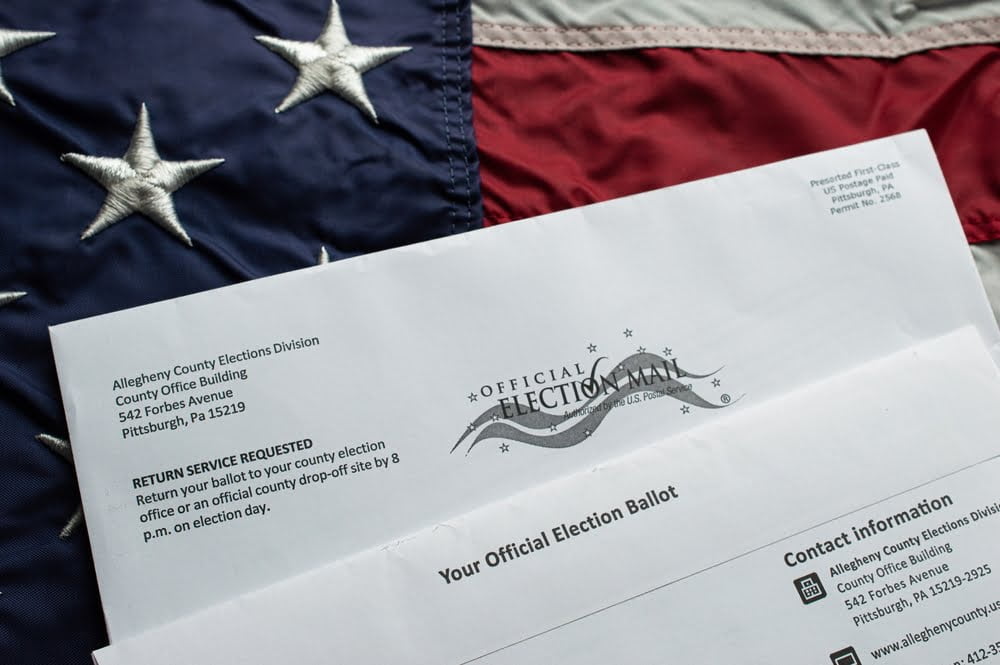A few relatively minor changes would allow Philadelphia to process mail ballots much faster and finish counting them much sooner after polls close on Election Day, an analysis by Votebeat and Spotlight PA has found.
The analysis found a wide disparity between Allegheny and Philadelphia — Pennsylvania’s two largest counties — in how quickly they counted mail ballots during the November 2022 election.
That year, Philadelphia processed ballots at a rate of 5,000 per hour, while Allegheny County, home to Pittsburgh and surrounding municipalities, processed more than 12,000 ballots per hour, based on an analysis of information provided by the counties, publicly available data, and data from the Pennsylvania Department of State.
While Philadelphia officials have publicly blamed counting delays on a state law that says poll workers can begin processing ballots only on the morning of Election Day, the analysis points to other culprits: outdated equipment and less staffing.
Public records show Philadelphia already has equipment that can open ballot envelopes much more quickly than its current equipment. Yet — until Wednesday, less than a month before the election — it was unclear if the city commissioners who make election decisions planned to use faster machines. That changed after the publication of this story, when the board agreed during a public meeting to move forward with using both types of machines on Nov. 5.
Update, 3:00 p.m., Oct 16, 2024: After this story was published, the commissioners affirmed at a public meeting that they would use faster ballot-processing equipment this November. The story has been updated throughout.
The stakes of an accurate yet swift ballot count couldn’t be higher, because each day that unofficial election results are delayed could breed more mistrust in the outcome.
In 2020, it took four days for the state to be called for Joe Biden, in large part due to the approximately 375,000 ballots Philadelphia was processing in that time. The delay led to conspiracy theories that fraudulent votes for Biden were added late in the counting process.
How Philadelphia and Allegheny diverge on the same task
Allegheny County and Philadelphia, for the most part, have similar processes.
The day starts with election workers checking the outer envelopes of mail ballots to ensure there are no defects that prevent them from being counted, such as a missing date or signature. The ballots are then run through a machine that opens the outer envelope. In both counties, workers then physically remove the secrecy envelope from the return envelope, and run the secrecy envelope through the opening machine, allowing access to the ballot inside. Then, workers take it out and flatten it so that the votes can be scanned and counted by a tabulation machine.
In comments to the Washington Post over the summer, City Commissioner Lisa Deeley said the barrier to having unofficial results on election night was that the city cannot, by state law, open mail ballot envelopes before 7 a.m. on Election Day. Commissioner Seth Bluestein made a similar comment to the Philadelphia Inquirer in September.
Getting a head start on that process before Election Day would require a change in the law. Many election officials, politicians, and the County Commissioners Association of Pennsylvania have advocated for such a change. But as many counties have shown in the years since the 2020 presidential election, with enough workers and the right equipment it is possible — albeit expensive — to count all mail ballots on Election Day.
Allegheny County election officials said the “secret sauce” to their county’s success is its high-speed envelope-opening machine. With an attachment, the Bluecrest Vantage mail sorter can open up to 50,000 envelopes an hour, according to the manufacturer. Allegheny County also uses three Opex Omation 306 machines for smaller ballot-processing jobs, which the manufacturer says can open 40,000 envelopes an hour.
READ: Pennsylvania Supreme Court Says It’s Too Late to Change Rules on Mail Ballots
By comparison, Philadelphia has 22 Opex machines called extraction desks, which can each open up to 3,600 ballots per hour, according to the manufacturer.
Records show that the Philadelphia City Commissioners office, which makes election-related decisions, purchased four of the faster Opex Omation machines over the summer. Philadelphia also has a Bluecrest machine it uses to sort ballots, not to open them.
At least one of the three commissioners, Deeley, does not want to use the new equipment this November to open envelopes. She made a motion at Wednesday‘s commissioners’ meeting to only use the extraction desks or hand letter openers to open both the secrecy and return envelopes.
Deputy City Commissioner Nick Custodio said Deeley opposes using the new Omation machines for opening ballots because they use a method that has been found with similar machines to damage the ballots inside. When that happens, election workers have to duplicate the ballot to tabulate it, a time-consuming process.
“Our priority is accuracy over speed,” Deeley said in an interview last Thursday. “It always has been and it remains that.”
However, Chairman Omar Sabir said last Friday a decision had not yet been made about the new machines.
“That’s like buying a Corvette and [you] don’t drive it,” he said. “We’ll do testing. We’ll see how it works. If it works the way we want it to work, we’ll use it.”
At Wednesday’s meeting, Deeley again expressed concern about the way the new machines open envelopes, saying she did not want to have the nation waiting on Philadelphia to recreate damaged mail ballots.
Joseph Lynch, director of election operations, said at the meeting he had tested the new equipment Tuesday and found no issues with it and would not recommend their use if he was not confident in their performance.
In a comment to Votebeat and Spotlight PA Wednesday, Forrest Lehman, elections director in Lycoming County, said he and many other counties also use the faster Omation machine. He said once it is adjusted properly, ballot damage rarely occurs.
READ: How 9 Mistakenly Discarded Ballots in Luzerne County Helped Fuel Trump’s 2020 Lies About Elections
Deeley’s motion was unsuccessful as no other commissioner seconded it, meaning that the city will use both sets of machines — each for a different type of job — in the upcoming election.
Other subtle differences between the two counties’ operations could also account for the disparity in speed.
Allegheny County will have a staff of roughly 200 to 220 people at its mail ballot processing facility on Election Day, while Philadelphia will employ two alternating day shifts of about 150 workers each, and 90 in a third overnight shift.
Philadelphia’s ballots are “batched” and kept together throughout all steps of the process and not mixed with other groups, to serve as another check on accuracy. Allegheny County does not keep ballots together in batches, a spokesperson said, though the county feels it can simultaneously prioritize accuracy, integrity, and speed.
“We have no concerns with our process,” Abigail Gardner, a spokesperson for Allegheny County, said.
Philadelphia also does what is called pollbook reconciliation, where it compares the names of people who cast ballots at in-person voting locations to those who sent in mail ballots, to ensure that no one who voted in person also voted by mail. This contributed to the delayed results in 2020, though it should be much quicker this year with the city’s adoption of electronic pollbooks, Deeley said.
This article was originally published by Votebeat, a nonprofit news organization covering local election administration and voting access. Sign up for their free newsletters here.







